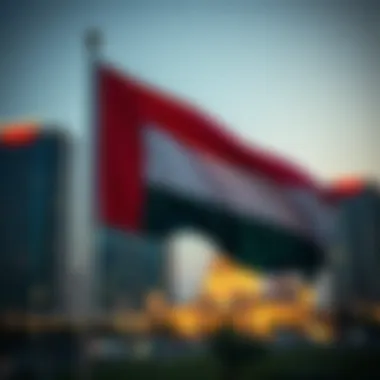Public Holidays in the UAE for July 2023: An Overview


Intro
As the sun blazes high and temperatures soar in July, the United Arab Emirates is not just a melting pot for tourists but also a vibrant hub teeming with festivities. This article explores the public holidays in the UAE for July 2023, shedding light on their historical significance, the various ways of observance across different emirates, and their overall impact on the culture and economy of the region.
The UAE, with its unique confluence of tradition and modernity, presents a fertile ground for understanding how public holidays shape social interactions and economic activities. For investors, real estate agents, and potential home buyers, understanding these holidays is not only about appreciating cultural nuances but also recognizing how these days can influence market trends and community dynamics.
In July 2023, the UAE will observe several key public holidays, each steeped in rich history and profound relevance to the local populace. By taking a closer look at these dates, we can gain deeper insights into their implications, while helping to navigate the potentially rich opportunities that lie within the country’s real estate market.
In the sections that follow, we will unfold a comprehensive narrative exploring public holidays specific to July 2023 in the UAE, and offer a distinct analysis on property types, market insights, and the interplay of culture and economic interests, paving the way for both new and seasoned investors alike.
Stay tuned as we kick off this journey through festive calendars and dynamic markets — it's surely a tale worth telling.
Preamble to Public Holidays in the UAE
Public holidays in the United Arab Emirates serve a pivotal role in both the cultural fabric and economic structure of the nation. These holidays are more than just days off work; they are essential moments that reflect the history, traditions, and diverse societal values prevalent in the UAE. With a rapidly evolving landscape, especially with the integration of different cultures and nationalities, understanding public holidays is vital for anyone looking to grasp the UAE's societal dynamics, particularly investors and industry professionals.
Understanding the Importance of Public Holidays
Public holidays often provide a sense of relief and a chance for reflection. They offer individuals a break from the rigors of daily life, allowing families to come together and communities to bond. In the UAE, holidays mark significant historical and religious commemorations, from Eid al-Fitr to national celebrations like UAE National Day. These occasions are steeped in tradition and often involve public festivities, social gatherings, and various cultural expressions.
For investors and industry professionals, recognizing these holidays can be a keystone for strategic planning. The fluctuating patterns of consumer behavior, tourism, and real estate transactions during holiday seasons present unique opportunities and challenges. Understanding the public holidays can guide business timelines, marketing campaigns, and service availability, making the knowledge not just relevant but indispensable for a successful approach in one of the world's most vibrant economies.
The Role of Holidays in UAE Society
In the UAE, public holidays play a multifaceted role in shaping social interactions and enhancing cultural heritage. These holidays act as a glue, binding diverse populations together through shared celebrations. For example, Eid al-Adha finds much of the population participating in communal prayers, feasts, and charitable acts, showcasing a commitment to community and family values.
Furthermore, different emirates often have their distinctive ways of celebrating, which adds another layer to the cultural mosaic of the country. These variations can be seen in Dubai's extravagant firework displays during Eid compared to more subdued family gatherings in Sharjah. Each region’s unique interpretation of public holidays fosters a deeper appreciation for the UAE's rich tapestry of customs.
Public holidays also serve as an opportunity for businesses to engage with consumers in meaningful ways. Retail outlets, property developers, and service providers often take advantage of holiday seasons to launch special promotions or events tailored to the festive spirit. Understanding and anticipating public holiday dynamics can pave the way for more targeted and effective business strategies.
"Public holidays are the soul of a nation’s heart. They reflect who we are, connecting generations through shared rituals and stories."
Key Public Holidays in July
Understanding the public holidays in July 2023 is key for anyone involved in the UAE's social and economic fabric. These holidays not only hold cultural significance but also impact routine operations across various sectors including real estate and tourism. Investors and residents alike must be aware of the changes these holidays invoke, facilitating informed decisions whether they are planning a trip or finalizing a property deal.
Eid al-Adha Celebrations
Significance of Eid al-Adha
Eid al-Adha, often acknowledged as the "Festival of Sacrifice," symbolizes the pious act of sacrifice performed by Prophet Ibrahim. This festival brings communities together, reinforcing familial bonds and affirming the spirit of charity. In the UAE, this holiday resonates powerfully as it encourages acts of kindness and the sharing of wealth. Its cultural importance cannot be overstated, as it emphasizes values like compassion and generosity, fostering unity among diverse population groups.
The presence of Eid al-Adha can also stimulate the economy, as the festivities propel various industries, from hospitality to retail. With increased spending during this time, it delineates an unrivaled opportunity for businesses looking to engage with local and expatriate communities.
Expected Dates Based on Lunar Calendar
The timing of Eid al-Adha revolves around the lunar calendar, specifically on the 10th of Dhu al-Hijjah. In 2023, the expected dates fall on June 28 or 29, depending on moon sighting. This fluidity introduces a thrilling element of anticipation each year, as communities wait to confirm the exact day.
Real estate players should note that knowing these dates can impact market activities. Certain sales cycles may compress or expand around holiday periods, so timing can be crucial when targeting property investments or looking to lease retail spaces.
Traditional Observances in the UAE


In the UAE, the observance of Eid al-Adha is a rich tapestry of age-old traditions intertwined with modern practices. From early morning prayers in mosques to the communal feasts that follow, the holiday seeps into everyday life, creating a vibrant atmosphere.
People often wear new clothes, decorate their homes, and engage in charity – a foundational aspect of Eid al-Adha. Families also gather to perform the Qurbani, the ritual slaughter of livestock, sharing the meat with those in need. Such practices not only enhance community ties but also distribute the joys of Eid across socioeconomic divides.
Arafah Day
Cultural Relevance of Arafah Day
Arafah Day marks the culmination of the Hajj pilgrimage, representing a pinnacle of spiritual reflection and connection to God. On this day, pilgrims gather on the plains of Arafat, praying and seeking forgiveness. For those not participating in the Hajj, it remains a day of profound significance, urging believers to reflect on their own lives and seek improvement.
In the UAE, Arafah Day emphasizes collective spirituality, urging individuals to participate in acts of charity and self-reflection. This festival aligns closely with the essence of community and social responsibility, central to the Emirati culture and Islamic teachings.
Connection to Eid al-Adha
Arafah Day directly leads into Eid al-Adha, establishing a spiritual bridge between reflection and communal celebration. This connection enriches the significance of both days, as they present individual and collective opportunities for devotion and giving.
Acknowledging the relationship between these two holidays is pivotal for understanding the flow of festivities in July. For those involved in property transactions, recognizing this link can shape marketing strategies, ensuring that materials resonate with cultural sentiments while forging stronger ties with potential clients.
Regional Variations in Holiday Observance
Understanding the regional differences in holiday observance is vital for recognizing the cultural fabric of the UAE. Each emirate possesses its own flair when it comes to celebrations, rooted deeply in local customs and traditions. This diversification enriches the country’s overall holiday experience and provides insights into its demographic composition.
When public holidays roll around, they are often marked by unique regional customs, local cuisine, and specific events. Thus, each emirate, from the glittering heights of Dubai to the tranquil settings of Umm Al-Quwain, showcases a distinct way of honoring these occasions. Residents and visitors alike benefit greatly from this varied tapestry, as they can participate in varied festivities and gain deeper appreciation of Emirati culture.
Moreover, knowing these differences is beneficial for investors and real estate professionals, as they can gear their strategies and communications according to local behaviors and preferences during holidays.
Differences Across Emirates
Dubai
Dubai, the bustling heart of the UAE, offers a unique spin on public holiday celebrations. One of its key characteristics is the fusion of modernity with tradition. High-profile events and extravagant displays often characterize holidays here. Just think of the spectacular fireworks during Eid; they light up the iconic Burj Khalifa, drawing crowds from all over.
This embrace of spectacle makes Dubai a favored destination during public holidays. Investors find it advantageous since the city’s vibrant atmosphere often translates into increased foot traffic and interest in properties, particularly in prime locations. However, the bustling nature of Dubai can also come with challenges, like crowded establishments and a spike in accommodation prices during the holiday season.
Abu Dhabi
In Abu Dhabi, the capital of the UAE, the public holidays take on a more traditional and family-centered approach. It is common to see families gathering in parks or homes to share meals and stories, showcasing the city’s commitment to cultural preservation. Eid al-Adha, for example, is not just marked by prayers at mosques but also by community feasts that reinforce family ties.
For investors, Abu Dhabi presents a stable real estate market with a focus on family-friendly environments. However, the slower pace during holidays can mean reduced commercial activity, requiring investors to adjust their strategies accordingly. The emphasis on culture and heritage during holidays helps underline the significance of long-term investments in residential and communal spaces.
Sharjah
Sharjah stands out with a distinct cultural identity, often referred to as the cultural capital of the UAE. Public holidays here are characterized by a mix of artistic and historical observances. Events may include art exhibitions, poetry readings, and traditional music performances, attracting a crowd that appreciates cultural depth.
Investors keen on properties in Sharjah may find opportunities driven by educational and cultural institutions. Residents value the rich tapestry of experiences available, but the push towards preserving cultural heritage might limit the kind of high-end commercial developments commonly seen in Dubai.
Other Emirates
The other emirates like Ajman, Fujairah, and Ras Al Khaimah also contribute their unique cultures to the public holiday observance. For instance, Ajman may feature simpler, more intimate celebrations focused on local traditions, while Fujairah boasts beautiful natural settings that attract visitors looking for peaceful retreats.
Investors must consider each emirate's distinct characteristics when assessing opportunities. The quieter observances in these regions mean that while celebrations may be less extravagant, they surely foster community and connection, potentially driving interest in local businesses and real estate.


When planning investments or holiday festivities, understanding these regional nuances can create a strong advantage.
Impact of Holidays on the Real Estate Market
Public holidays in the UAE hold substantial weight not only culturally but economically, especially in the realm of real estate. The way these holidays influence market dynamics is multifaceted, affecting everything from property transactions to rental pricing. Understanding these intricacies can be invaluable for investors, agents, and buyers as they navigate these seasonal shifts.
Property Transactions During Holidays
Changes in Market Activities
During public holidays, the real estate market experiences shifts that can be quite significant. These changes often stem from the easing of business routines and the expectation of festive activities. There’s a noticeable uptick in property viewings and transactions as families take time off work and explore potential investments. Buyers, especially expatriates, tend to actively seek new homes during this period, lured by the celebratory spirit and potentially softer negotiation conditions.
However, while holidays offer a prime opportunity for increased engagement, it can also lead to a temporary slowdown in transactions, particularly as many agents and investors take extended breaks. Thus, the market may seem less active at first sight. Balancing these factors adds complexity for anyone involved in real estate during this festive season.
"Holidays are more than just a break; they can represent a pivotal moment for strategic investment decisions."
This holiday momentum brings both excitement and caution, encouraging residents to be proactive while also remaining grounded in market realities.
Investor Strategies Around Holiday Seasons
Holiday seasons can prompt savvy investors to alter their strategies for engaging with the market. Some choose to dive right in, capitalizing on the increased buyer activity. They may offer promotions or bundle deals on properties, aiming to attract buyers looking for worthwhile investments during their time off.
On the flip side, others may opt for a more cautious approach, waiting for post-holiday periods to gauge long-term trends and price stability before making substantial commitments. The key here is to understand how to leverage holiday-related behaviors, like festive buying incentives or targeted marketing efforts, to tap into the market effectively.
Investors must be aware that these strategies can vary widely depending on their prior experiences and current market conditions. The fluctuating nature of buyer interest during holidays can mean the difference between a lucrative deal and a misstep.
Seasonal Effects on Rental Markets
Short-Term Rentals vs. Long-Term Rentals
The relationship between holidays and rental markets showcases an intriguing rival between short-term and long-term rentals. Short-term rental properties, primarily serviced apartments and vacation homes, often see a boom during public holidays. Tourists flock to the UAE in search of unique hospitality experiences, whether it's for Eid celebrations or summer vacations.
Such rentals typically have higher occupancy rates during holidays, driven by visitors looking to immerse themselves in local customs and celebrations. However, it’s crucial to note that this rise in demand can also lead to fierce competition and possibly inflated prices.
Long-term rentals, meanwhile, tend to stabilize. While local demand remains steady for families and residents, landlords might find it more challenging to fill vacancies during holiday periods. Consequently, a strategic approach is essential when considering rental properties for investment.
Tourism Influence on Rental Prices
The tourism sector plays a pivotal role in shaping rental prices around public holidays. Increased tourist activity often correlates with heightened demand for rentals. This influx not only affects pricing strategies but also influences how properties are marketed. Owners may raise prices for short-term rentals in response to the surge in visitors, capitalizing on peak periods like Eid.
However, such strategies need calibration. If rates are excessively high, potential renters might look elsewhere, choosing properties that offer better value.
In summary, the interplay between holidays, tourism, and rental prices demands careful consideration for anyone with a stake in the UAE real estate market. Investors and residents alike must stay attuned to these shifts to navigate their investments effectively.
Cultural Experiences During July Holidays
Cultural experiences during public holidays in the UAE in July are rich, vibrant, and a reflection of the country's historical roots and modern identity. Within this context, the Eid al-Adha celebrations set the stage for a unique blend of traditional practices and contemporary interpretations. These moments not only highlight the significance of community bonding, but also provide ample opportunities for cultural expression, fostering a deeper understanding of the UAE’s diverse heritage. For residents and visitors alike, these experiences are pivotal in reinforcing connections to both the past and the present.
Festivities and Events
Community Gatherings


Community gatherings during the holidays serve as vital touchstones for many individuals living in the UAE. These events are often characterized by their inclusivity, drawing together people from various backgrounds to celebrate shared customs. This unifying aspect of community gatherings is crucial as it showcases how different cultures can come together harmoniously to foster mutual respect.
One prominent feature of these gatherings is the communal spirit. Neighbors often invite each other over for meals, allowing for spontaneous celebrations that strengthen social ties. Workshops, fairs, and parades are commonly organized, offering avenues for artistic expression and cultural exchange. As an example, local parks might host events where traditional dance and music is performed, inviting participation from everyone. Not only does this encourage learning about local customs but also enriches the overall festive atmosphere.
However, it’s important to note that while these gatherings are overwhelmingly positive, they can also present logistical challenges. The influx of attendees can lead to crowded venues, requiring careful planning to ensure participants experience the festivities comfortably.
Traditional Foods and Customs
Traditional foods are a cornerstone of cultural experiences during Eid al-Adha. The act of sharing meals is laden with significance; it reflects generosity, hospitality, and the essence of the holiday itself. Classic dishes such as lamb majboos and kebabs can be found gracing tables, often accompanied by aromatic rice and a medley of spices that tantalize the taste buds.
Additionally, the preparation of these dishes frequently involves family collaboration, reinforcing shared values and traditions handed down through generations. It’s not just about the eating; it’s about coming together to create. Those involved in these customs often find joy in teaching younger family members how to cook traditional meals, thus preserving culinary heritage.
Nevertheless, cooking traditional foods can be time-consuming, which might be a drawback for some families. Not everyone has the luxury to spend hours in the kitchen, especially with the busy pace of modern life. This has led to some families opting for catered meals or dining out, potentially affecting how traditions are passed down.
Practical Considerations for Residents and Investors
Understanding the landscape of public holidays in the UAE provides residents and investors with essential insights. These holidays can significantly influence daily life, business operations, and the overall market environment. Whether one is a family planning activities or an investor evaluating property transactions, being aware of how these junctures shift schedules and services is paramount.
Navigating Public Services During Holidays
Changes in Office Hours
During public holidays, business hours often adjust, which can be a crucial aspect for anyone living or working in the UAE. Government offices and private businesses may have reduced or significantly altered hours. Typically, many close, allowing employees to engage in family celebrations. For instance, government services might operate only part-time, or even not at all, especially during the festive days surrounding Eid al-Adha. This situation encourages residents to plan their errands in advance, preventing last-minute scrambles.
The benefit of these changes lies in the reflection of cultural values. It fosters community engagement and allows individuals to celebrate traditions. However, the potential downside is that this can disrupt routine transactions for individuals needing to finalize business activities or attend to urgent matters.
Availability of Services
Along with changes in office hours, the availability of services also varies during the holiday season. Some essential services, like healthcare, remain open, but they might also operate on a diminished schedule. Other businesses, such as restaurants and retail shops, usually see an influx of customers during the holidays.
The primary characteristic of this availability is the adaptability of businesses to cater to both locals and tourists. For instance, hotels typically maintain full service while also offering special holiday packages for visitors. This aspect is beneficial for families looking to engage in holiday activities and for investors aiming to capitalize on the increased demand for accommodation. However, it's important for investors to keep in mind that, despite the increase in service availability, not all services may meet the same standards as during normal operating hours. Awareness of service limitations is necessary for making informed decisions.
Planning for Holiday Activities
Recommendations for Families
Families should take time to plan their holiday activities well ahead. With the holidays’ cultural significance, many families look forward to communal gatherings, which can provide memorable experiences. Planning might involve reserving tables at restaurants that showcase traditional cuisine or seeking out community events that celebrate the essence of Eid al-Adha.
A major appealing aspect of these recommendations is that they enable families to enjoy the essence of the holiday without the last-minute chaos. Participating in local festivities not only strengthens family bonds but also enhances the overall appreciation for the cultural richness that the UAE offers. However, high demand for certain events can lead to fully booked venues, so early planning is key.
Tips for Visitors
For visitors, navigating the holiday period can be exciting yet tricky. Recommendations tailored for tourists often include understanding local customs and preparing for potential closures. It can be wise for visitors to research ongoing events, which can include cultural exhibitions and special dinners. This ensures they’re getting the most from their trip.
A distinctive feature here is the diverse array of options available to visitors to witness local traditions firsthand. While this may result in an enriched cultural experience, it can also pose challenges if visitors aren't familiar with the local practices during holidays. One needs to balance between exploring and respecting traditions, and remaining open to spontaneous opportunities that arise during their stay.
Finale: Embracing Cultural Heritage
The observance of public holidays in the UAE serves as a pivotal thread weaving through the country’s rich tapestry of cultural heritage. These holidays are more than just breaks from routine; they encapsulate the values, traditions, and historical narratives that shape the national identity. In July 2023, with Eid al-Adha and Arafah Day being focal points, the significance of these occasions shines not only in the festive celebrations but also in their deeper connections to faith, family, and community.
Through understanding the importance of these holidays, residents and investors alike can appreciate how they contribute to social cohesion. Festivities like Eid al-Adha promote communal bonds as families come together to engage in prayers, share meals, and participate in charity. This is a reminder that the economy is not solely driven by transactions but by the relationships that underpin them.
"Public holidays act as time capsules that transport individuals through their heritage, reminding them of shared values and common goals."
For investors and industry professionals, this cultural awareness is essential. By recognizing how holidays affect consumer behavior and market dynamics, stakeholders can navigate their strategies with greater insight. Take for instance, the rush in property transactions leading up to these breaks. Many families seek to settle into homes before the celebrations begin, which can lead to a spike in real estate activity.
Moreover, the holiday season is a poignant reminder of the UAE’s diverse demographic makeup; it showcases how various communities within the nation enrich the cultural landscape through their unique traditions and practices. This diversity can have economic implications, influencing everything from the services offered in hospitality to the types of products that gain popularity during these celebrations.
Investors considering the long-term potential of their involvement in the UAE’s market would benefit from recognizing these nuances of holiday observance. It’s not solely about capitalizing on peak rental moments, but also cultivating a respect for the local customs that draw expatriates and tourists alike. Ultimately, embracing the cultural heritage reflected in these holidays fosters a more profound connection to the UAE, bridging gaps between different societal segments and reinforcing a sense of community that is vital for a sustainable future.











